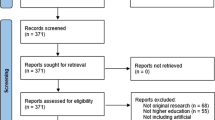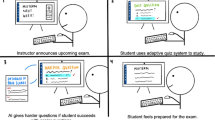Abstract
This study examines differences in university students’ approaches to learning when attending tutorials as well as variation in students’ perceptions of tutorials as an educational arena. In-depth qualitative analysis of semi-structured interviews with undergraduates showed how surface and deep approaches to learning were revealed in the students’ note-taking, listening, and engaging in dialogue. It was also shown how variation in the students’ approaches to learning were coherent with variation in the students’ perceptions of the tutors’ pedagogical role, the value of peer interaction, and the overall purpose of tutorials. The results are discussed regarding the paradox that students relying on surface approaches to learning seemingly are the ones least likely to respond to tutorials in the way they were intended.

Similar content being viewed by others
References
Anderson, C. (2005). Enabling and shaping understanding through tutorials. In F. Marton, D. Hounsell, & N. Entwistle (Eds.), The experience of learning (3rd ed., pp. 187–197). Edinburgh: Centre for Teaching, Learning and Assessment.
Baeten, M., Kyndt, E., Struyven, K., & Dochy, F. (2010). Using student-centred learning environments to stimulate deep approaches to learning: Factors encouraging or discouraging their effectiveness. Educational Research Review, 5(3), 243–260.
Biggs, J. (2003). Teaching for quality learning at university: What the student does (2nd ed.). Maidenhead: Open University Press.
Eley, M. (1992). Differential adoption of study approaches within individual students. Higher Education, 23(3), 231–254.
Ellis, R., Calvo, R., Levy, D., & Tan, K. (2004). Learning through discussions. Higher Education Research and Development, 23(1), 73–93.
Ellis, R., Goodyear, P., Prosser, M., & O’Hara, A. (2006). How and what university students learn through online and face‐to‐face discussion: Conceptions, intentions and approaches. Journal of Computer Assisted learning, 22(4), 244–256.
Entwistle, N. (1991). Approaches to learning and perceptions of the learning environment: Introduction to the special issue. Higher Education, 22(3), 201–204.
Entwistle, N. (2009). Teaching for understanding at university: Deep approaches and distinctive ways of thinking. Basingstoke: Palgrave Macmillan.
Entwistle, A., & Entwistle, N. (1992). Experiences of understanding in revising for degree examinations. Learning and Instruction, 2(1), 1–22.
Entwistle, N., & Ramsden, P. (1983). Understanding student learning. London: Croom Helm.
Entwistle, N., & Tait, H. (1990). Approaches to learning, evaluations of teaching, and preferences for contrasting academic environments. Higher Education, 19(2), 169–194.
Hodgson, V. (1984). Learning from lectures. In F. Marton, D. Hounsell, & N. Entwistle (Eds.), The experience of learning (2nd ed., pp. 90–102). Edinburgh: Scottish Academic Press.
Hounsell, D. (1984). Learning and essay-writing. In F. Marton, D. Hounsell, & N. Entwistle (Eds.), The experience of learning (2nd ed., pp. 103–123). Edinburgh: Scottish Academic Press.
Hounsell, D. (2005). Understanding teaching and teaching for understanding. In F. Marton, D. Hounsell, & N. Entwistle (Eds.), The experience of learning (3rd ed., pp. 239–257). Edinburgh: Centre for Teaching, Learning and Assessment.
Kember, D., Jenkins, W., & Ng, K. (2003). Adult students’ perceptions of good teaching as a function of their conceptions of learning—Part 1. Influencing the development of self-determination. Studies in Continuing Education, 25(2), 239–251.
Laurillard, D. (1984). Learning from problem-solving. In F. Marton, D. Hounsell, & N. Entwistle (Eds.), The experience of learning (2nd ed., pp. 124–143). Edinburgh: Scottish Academic Press.
Lea, S., Stephenson, D., & Troy, J. (2003). Higher education students’ attitudes to student-centred learning: Beyond ‘educational bulimia’? Studies in Higher Education, 28(3), 321–334.
Lonka, K., & Ahola, K. (1995). Activating instruction: How to foster study and thinking skills in higher education. European Journal of Psychology of Education, 10(4), 351–368.
Lonka, K., Sharafi, P., Karlgren, K., Masiello, I., Nieminen, J., Birgegaard, G., et al. (2008). MED NORD—A tool for measuring medical students’ well-being and study orientations. Medical Teacher, 30(1), 72–79.
Marton, F., Dall’Alba, G., & Beaty, E. (1993). Conceptions of learning. International Journal of Educational Research, 19(3), 277–300.
Marton, F., & Säljö, R. (1976a). On qualitative differences in learning: I—Outcome and process. British Journal of Educational Psychology, 46, 4–11.
Marton, F., & Säljö, R. (1976b). On qualitative differences in learning: II—Outcome as a function of the learners conception of the task. British Journal of Educational Psychology, 46, 115–127.
Marton, F., & Säljö, R. (2005). Approaches to learning. In F. Marton, D. Hounsell, & N. Entwistle (Eds.), The experience of learning (3rd ed., pp. 39–58). Edinburgh: Centre for Teaching, Learning and Assessment.
McCune, V. (2004). Development of first-year students’ conceptions of essay writing. Higher Education, 47(3), 257–282.
Miles, M., & Huberman, M. (2005). Qualitative data analysis: An expanded sourcebook (2nd ed.). Thousand Oaks: SAGE.
Parpala, A., Lindblom-Ylänne, S., Komulainen, E., Litamen, T., & Hirsto, L. (2010). Students’ approaches to learning and their experiences of the teaching–learning environment in different disciplines. British Journal of Educational Psychology, 80(2), 269–282.
Pritchard, A., & Woollard, J. (2010). Psychology for the classroom: Constructivism and social learning. London and New York: Routledge.
Prosser, M., & Trigwell, K. (1999). Understanding learning and teaching: The experience in higher education. Maidenhead: SRHE and Open University Press.
Rocca, K. (2010). Student participation in the college classroom: An extended multidisciplinary literature review. Communication Education, 59(2), 185–213.
Tynjälä, P. (1999). Towards expert knowledge? A comparison between a constructivist and a traditional learning environment in the university. International Journal of Educational Research, 31, 357–442.
Vermetten, Y., Vermunt, J., & Lodewijks, H. (2002). Powerful learning environments? How university students differ in their response to instructional measures. Learning and Instruction, 12(3), 263–284.
Acknowledgments
The author would like to warmly thank Dr. Velda McCune, Dr. Noel Entwistle, and Dr. Charles Anderson for advice on this study.
Author information
Authors and Affiliations
Corresponding author
Rights and permissions
About this article
Cite this article
Herrmann, K.J. Learning from tutorials: a qualitative study of approaches to learning and perceptions of tutorial interaction. High Educ 68, 591–606 (2014). https://doi.org/10.1007/s10734-014-9731-3
Published:
Issue Date:
DOI: https://doi.org/10.1007/s10734-014-9731-3




